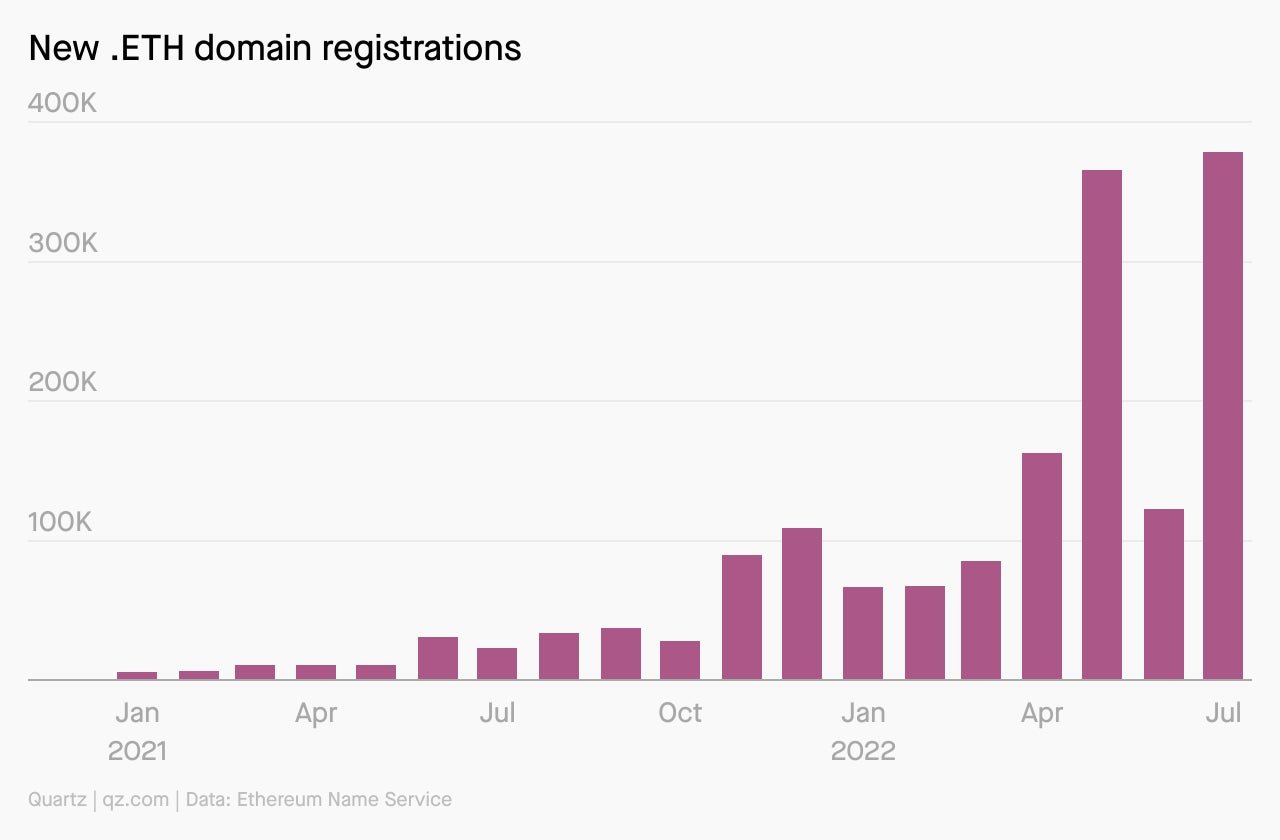🌎 Biden's signature bill becomes law
Plus: Crypto domain names are the next crypto.

Good morning, Quartz readers!
Here’s what you need to know
US president Joe Biden signed a landmark climate, health, and tax bill into law. The legislation will boost investment in cleantech like electric vehicles. Ford is already reaping the benefits of EV enthusiasm.
Republican Liz Cheney lost her Congressional seat. The Wyoming lawmaker, a key player in the Jan. 6 investigation, paid the price of standing up to former president Donald Trump.
The US housing market cooled down. Construction of new homes has slowed down to early 2021 levels, and more deals are foundering as buyers pull out over higher mortgage rates.
American Airlines put down a deposit on 20 Boom supersonic jets. The aircrafts, when ready, should cut the travel time of trans-Atlantic flights by half.
Wall Street was happily surprised by Walmart’s earnings. The retail behemoth said it’s seeing more high-earning customers visit its stores to buy cheaper goods during high inflation.
Crisis-hit Cuba opened up to foreign investors. The move reverses a 1960s policy nationalizing retail in a bid to end basic goods shortages.
What to watch for
Whether it’s actually selling most of its shares in Meituan, things aren’t looking great for Tencent. The Chinese gaming and social media giant, which runs the massively influential app WeChat, reported a drop in revenue as a stricter regulatory environment and covid-19 lockdowns take a toll.
Tencent’s been missing revenue estimates each quarter since the start of 2020, but the latest results showed the company’s first-ever revenue decline, with the figure coming in at 134 billion yuan ($19.7 billion), or a 3% year-over-year dip.
Tencent’s big money maker, advertising, dried up as brands move to cut costs to offset macro headwinds, while Tencent’s gaming business, which makes up about a third of the company’s sales, has been hampered by regulatory pressures.
Crypto domain names are hot, crypto itself is not
There’s a crypto land grab afoot, but this time it doesn’t involve shiba inu-themed coins.
Administered by the Ethereum Name Service, an .eth domain serves as a public profile to showcase one’s Ethereum blockchain transactions and holdings—and it can also be sold as an NFT. In July, the ENS reported record numbers: 378,804 .eth domain names were registered, 25,000 names were renewed, and it made about $3.9 million in net income.

Why bother? A three- or four-digit ENS domain could land you in online social communities and bragging rights arenas like the 999 and 10k clubs. But it’s not cheap: Membership in these clubs could cost you tens of thousands of dollars.
This boom comes at an odd time for the broader crypto industry. While domain sales are up, most crypto assets are down. But this speculative boom is, in a sense, something internet entrepreneurs have been doing for decades: buying up domain names to make a buck.
India’s in hot water with FIFA
Yesterday, FIFA suspended the All India Football Federation with immediate effect due to “undue influence from third parties.” India stands to lose out on hosting the Under-17 Women’s World Cup 2022, which began selling tickets earlier this month.
Ananya Bhattacharya takes a look at the AIFF’s problems and how they reflect a sports industry riddled with corruption and nepotism.
✦ Love stories like this one? Member support helps keep Quartz stories free and accessible to all. Daily Brief readers can take 40% off!
Surprising discoveries
Access to free menstrual products is now a legal right in Scotland. The law is considered to be the first of its kind in the world.
Celebrity investors want to bring the Tasmanian tiger back from extinction. The ambitious project is helmed by a startup whose backers include the Hemsworth brothers and Paris Hilton.
The Florida airspace has gotten too crowded. Military exercises, space launches, private jets, and tough weather are clogging up the skies for commercial flights.
Corneal implants made from pig skin protein may actually work. Restored eyesight in a clinical trial shows promise for a cheaper, more readily available alternative to organ donation.
The UK’s newest museum might hold Britain’s oldest known vertebrate embryo. What to expect when a 180 million-year-old fossil is expecting!
Our best wishes for a productive day. Send any news, comments, pig solutions, and 180 million-year-old baby showers to [email protected]. Reader support makes Quartz available to all—become a member. Today’s Daily Brief was brought to you by Susan Howson, Scott Nover, Sofia Lotto Persio, and Morgan Haefner.